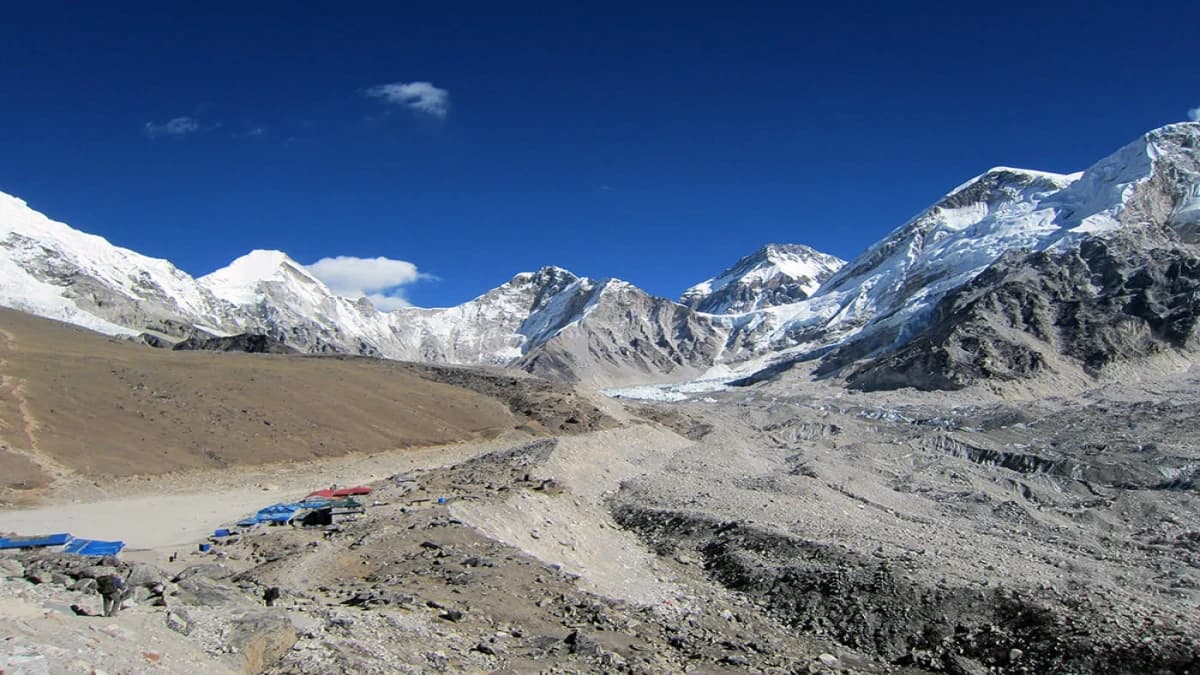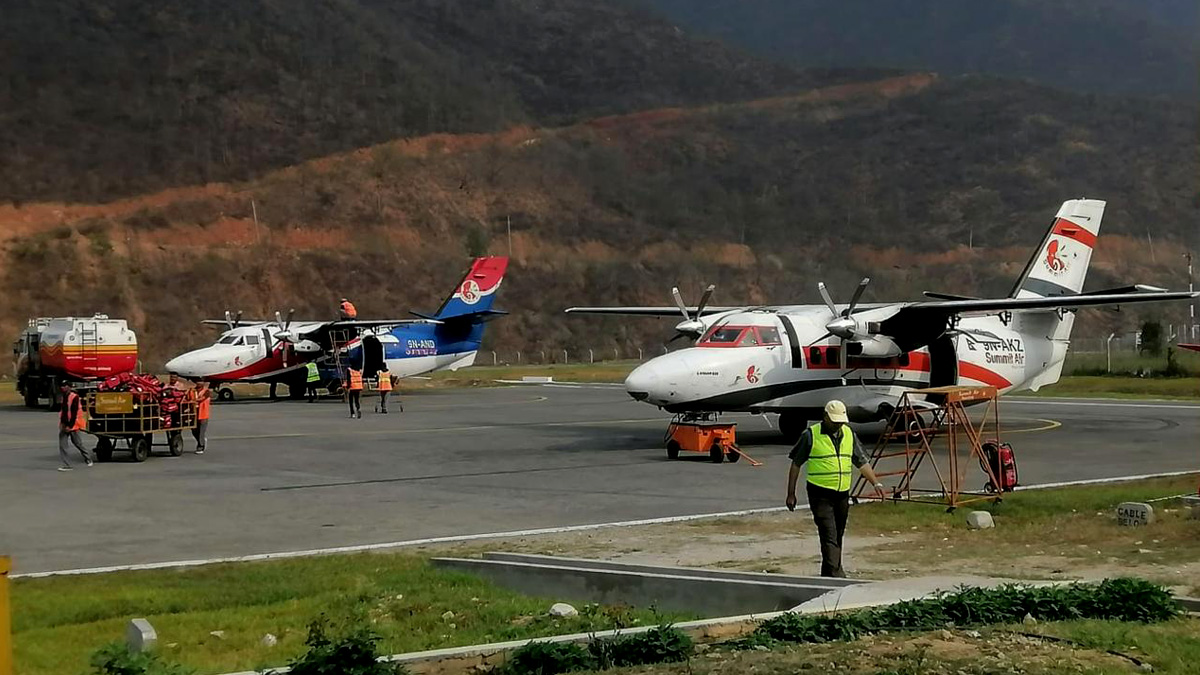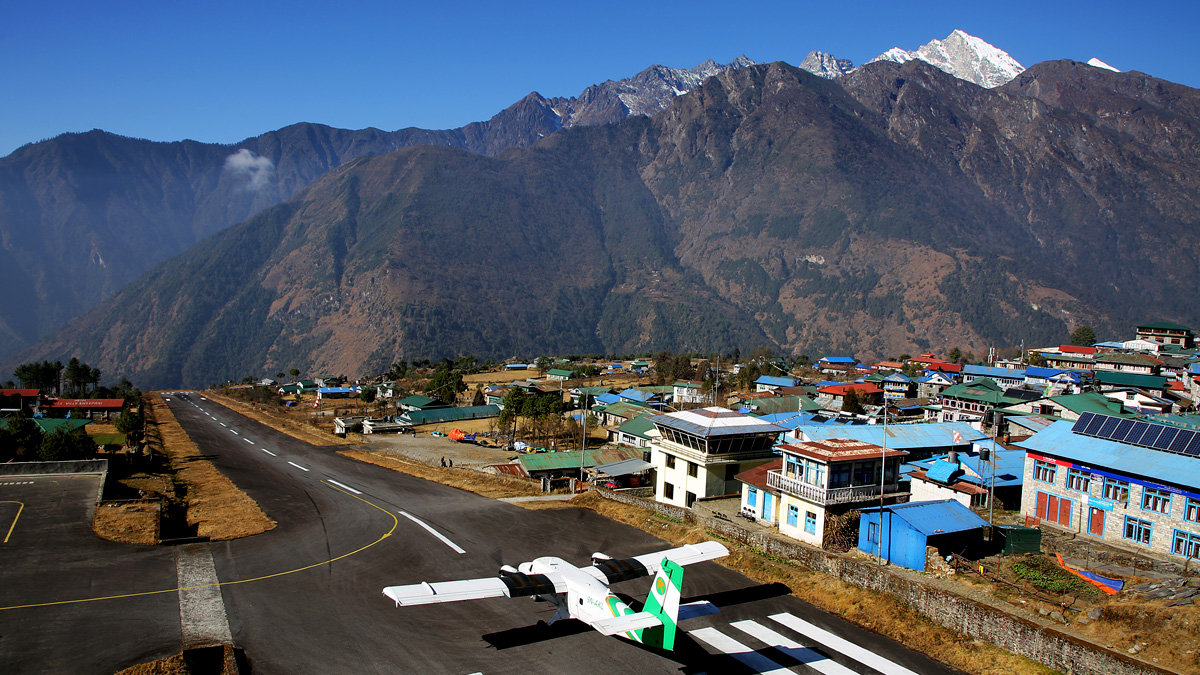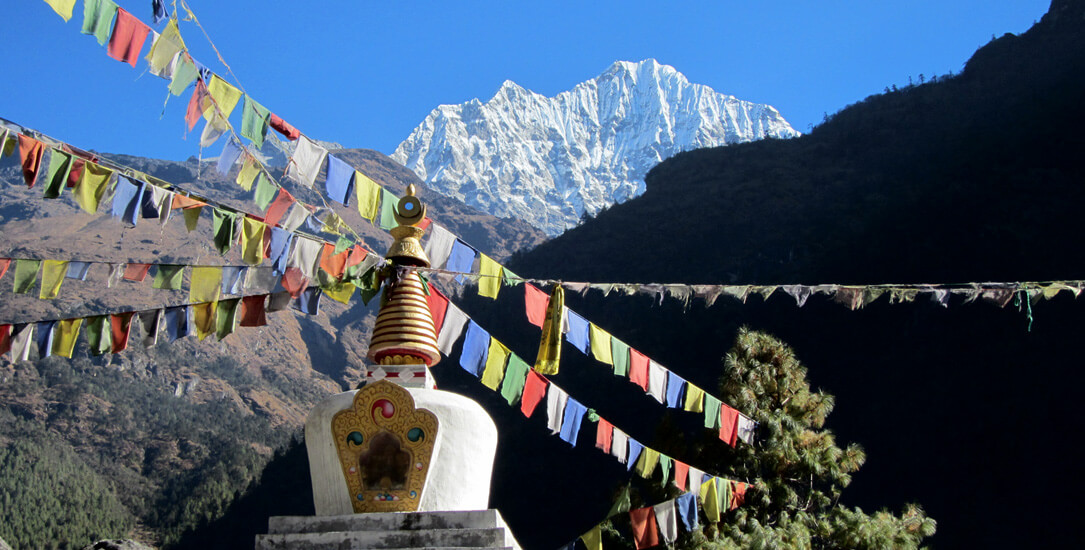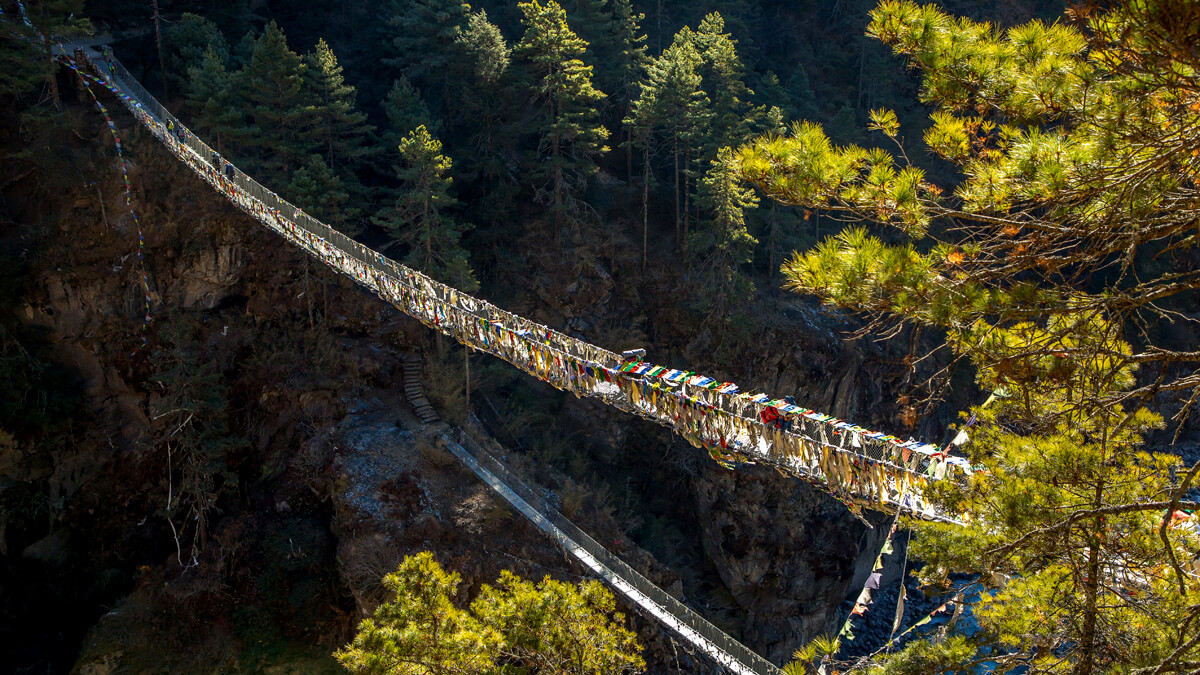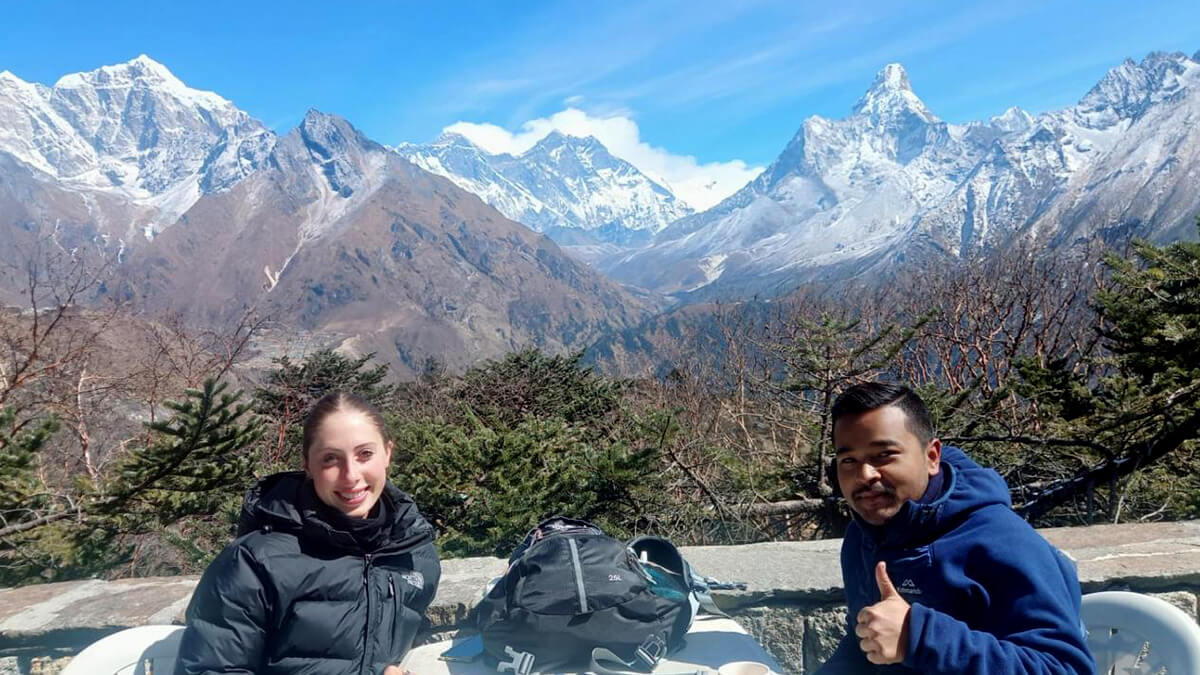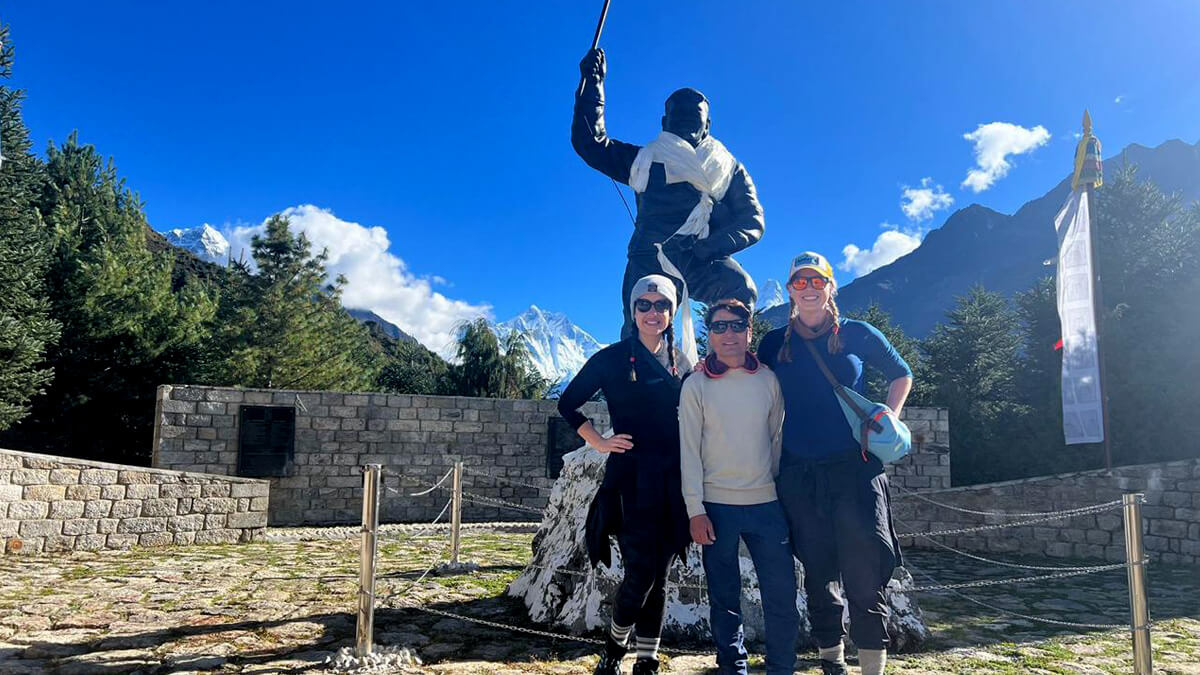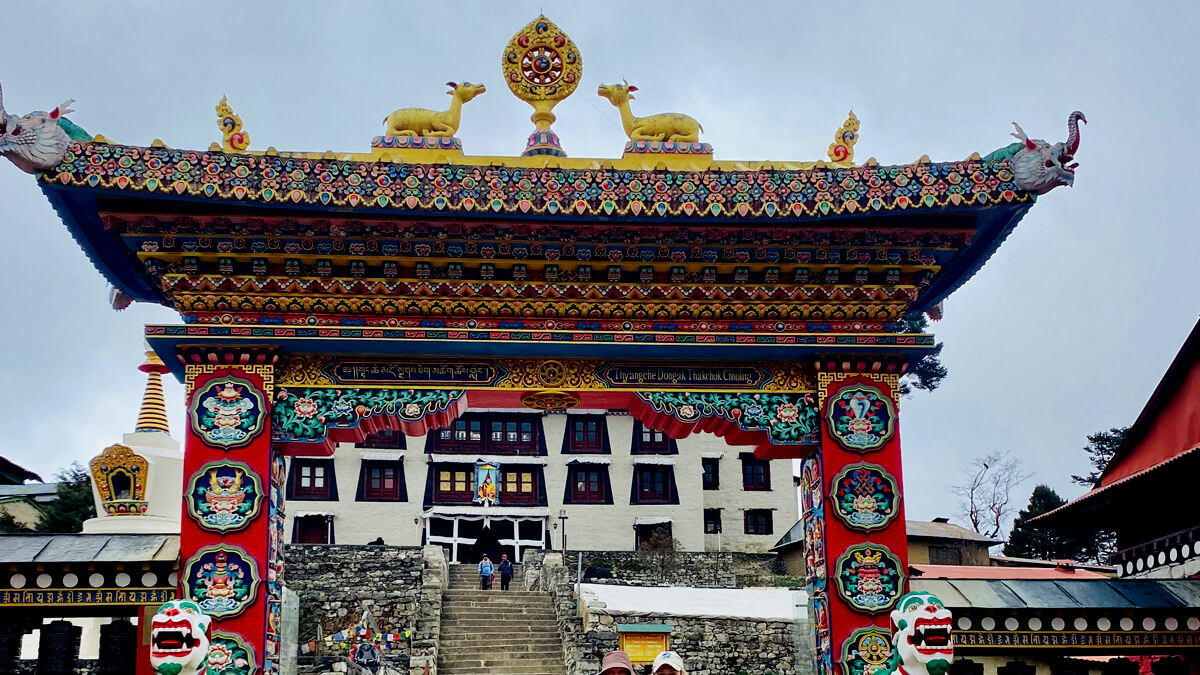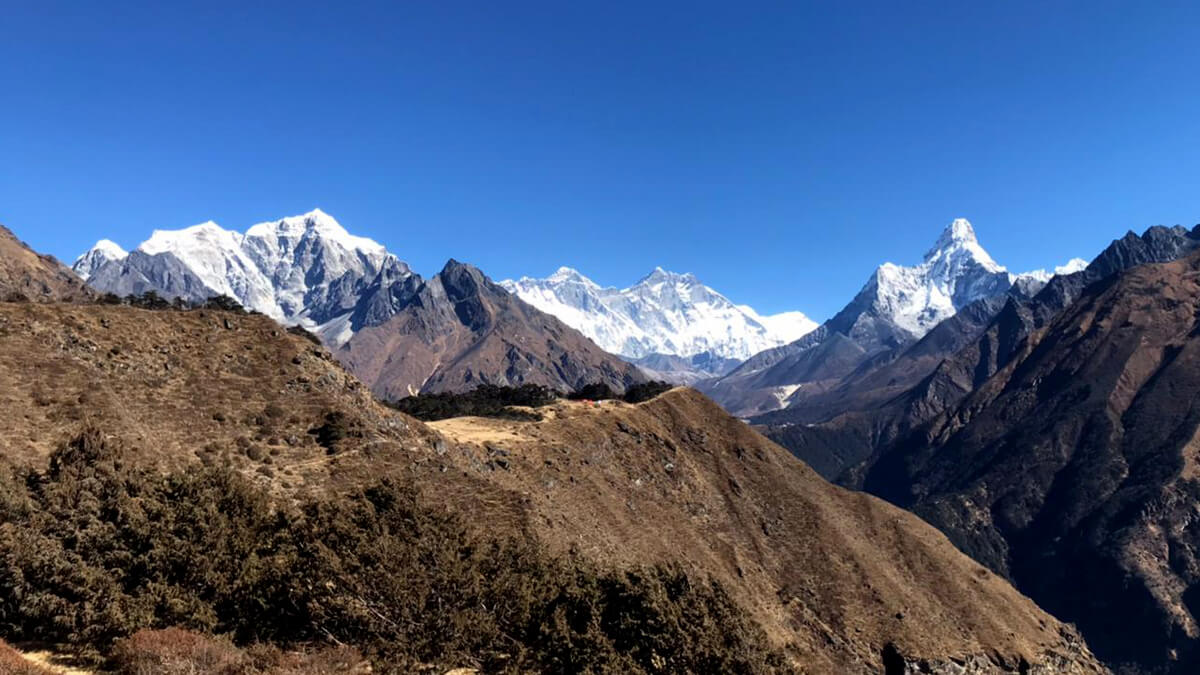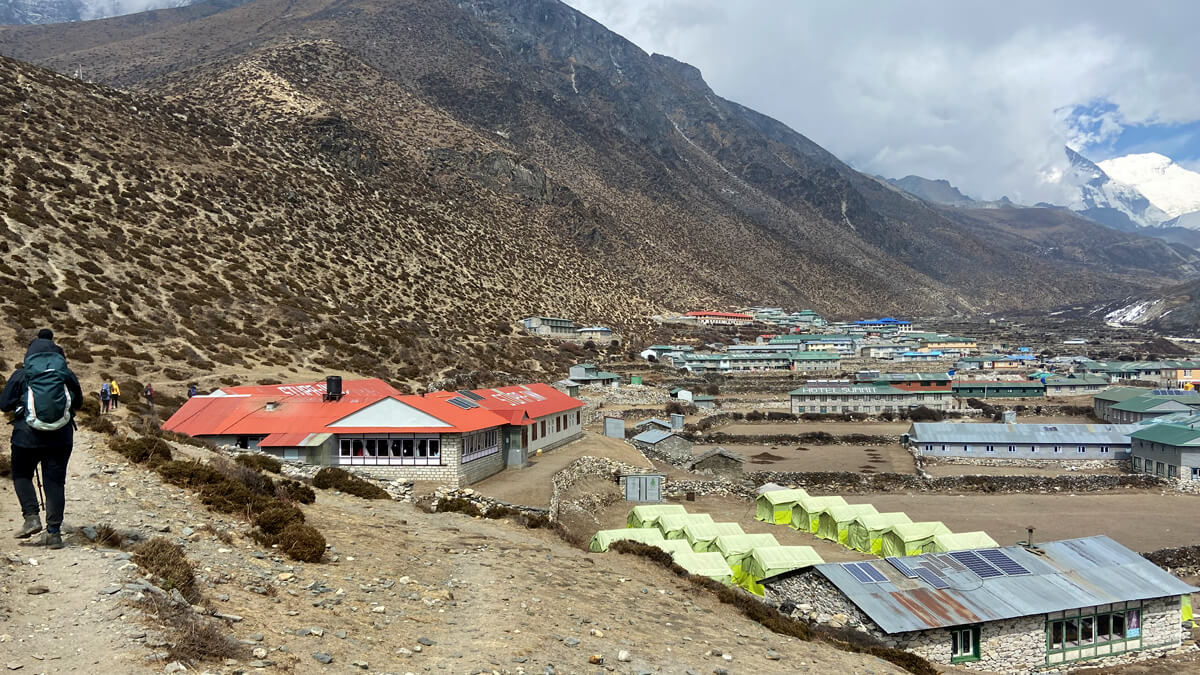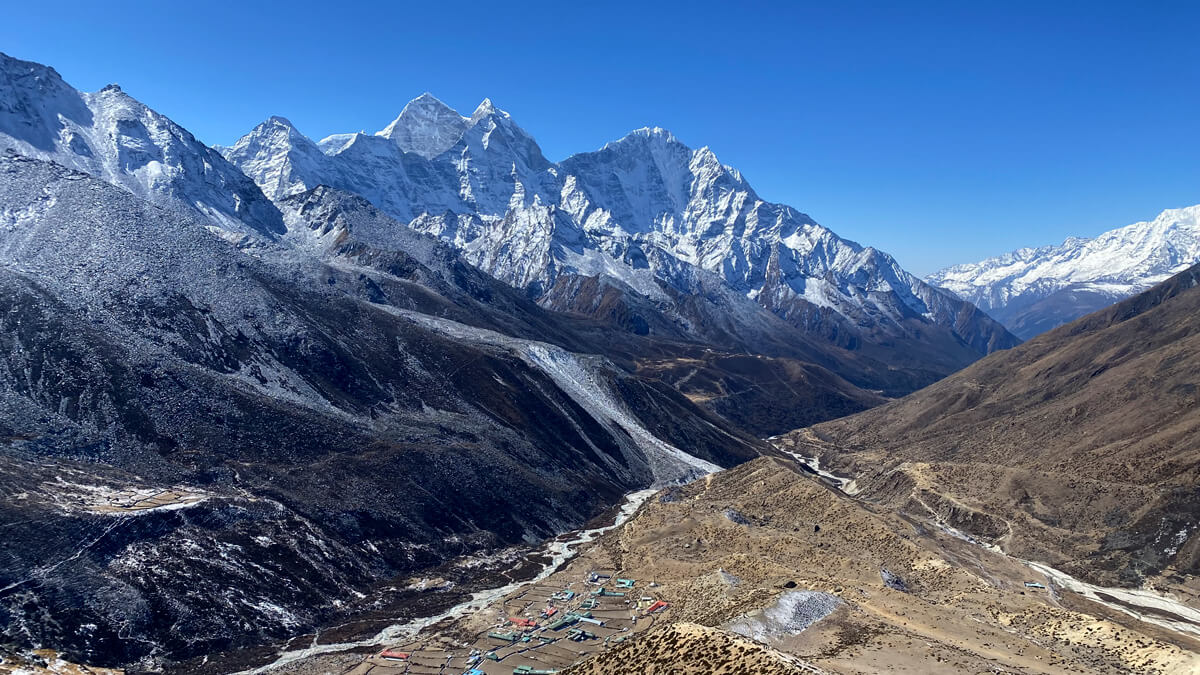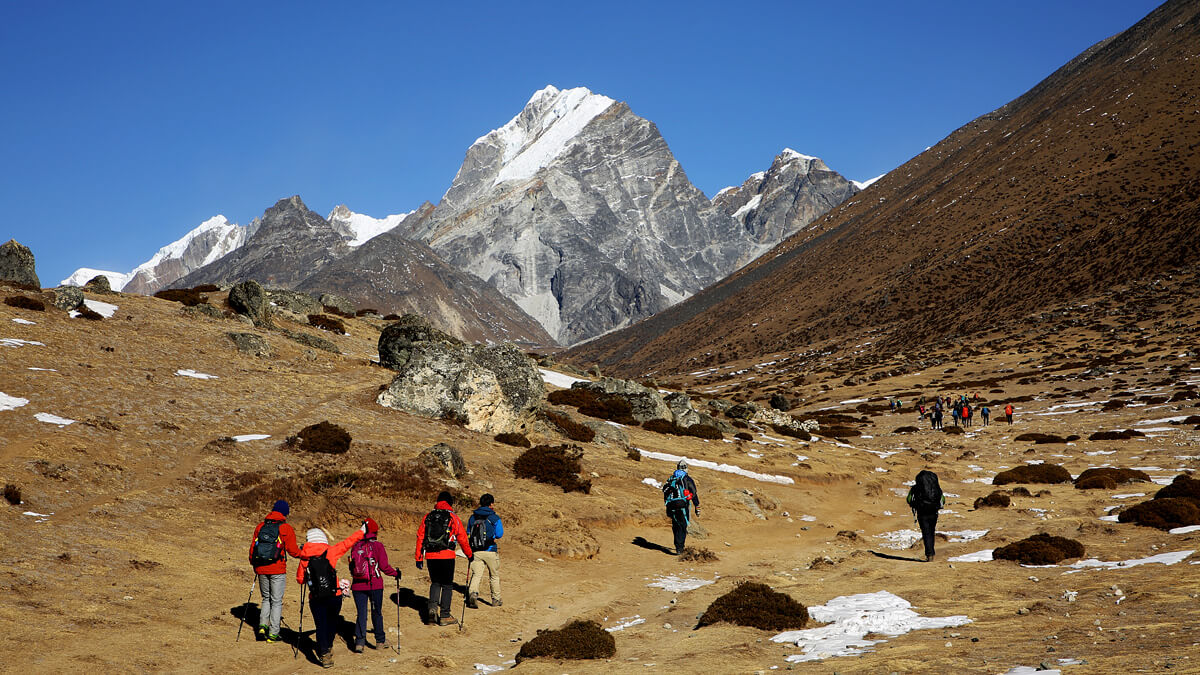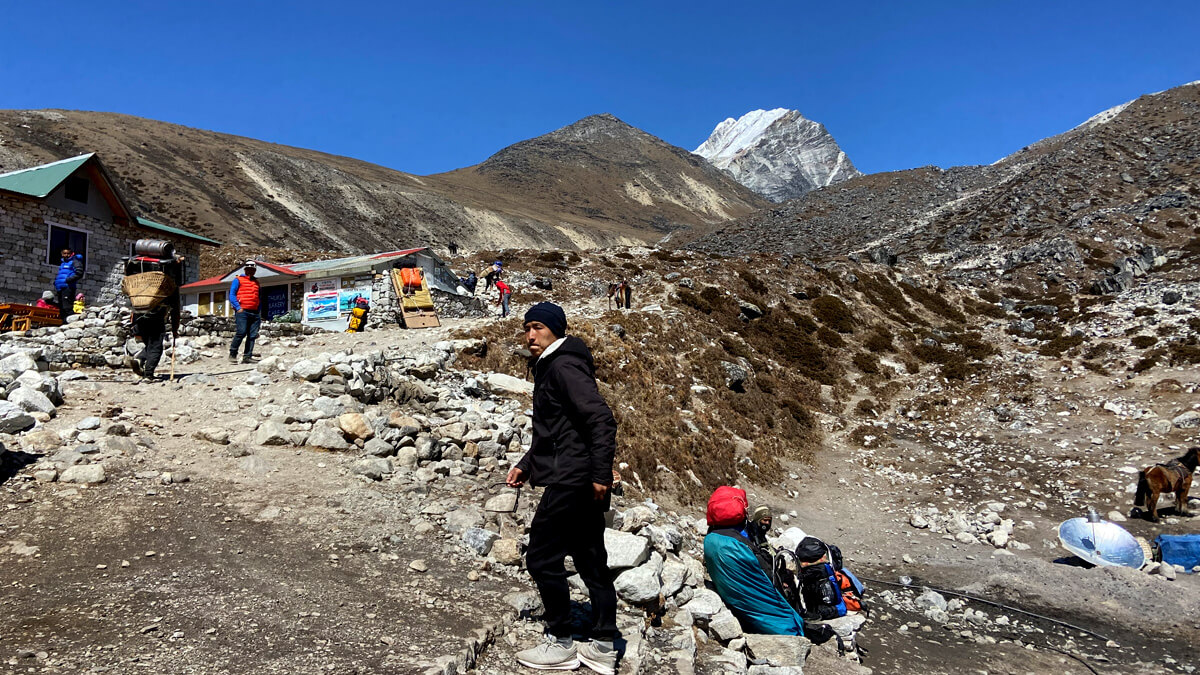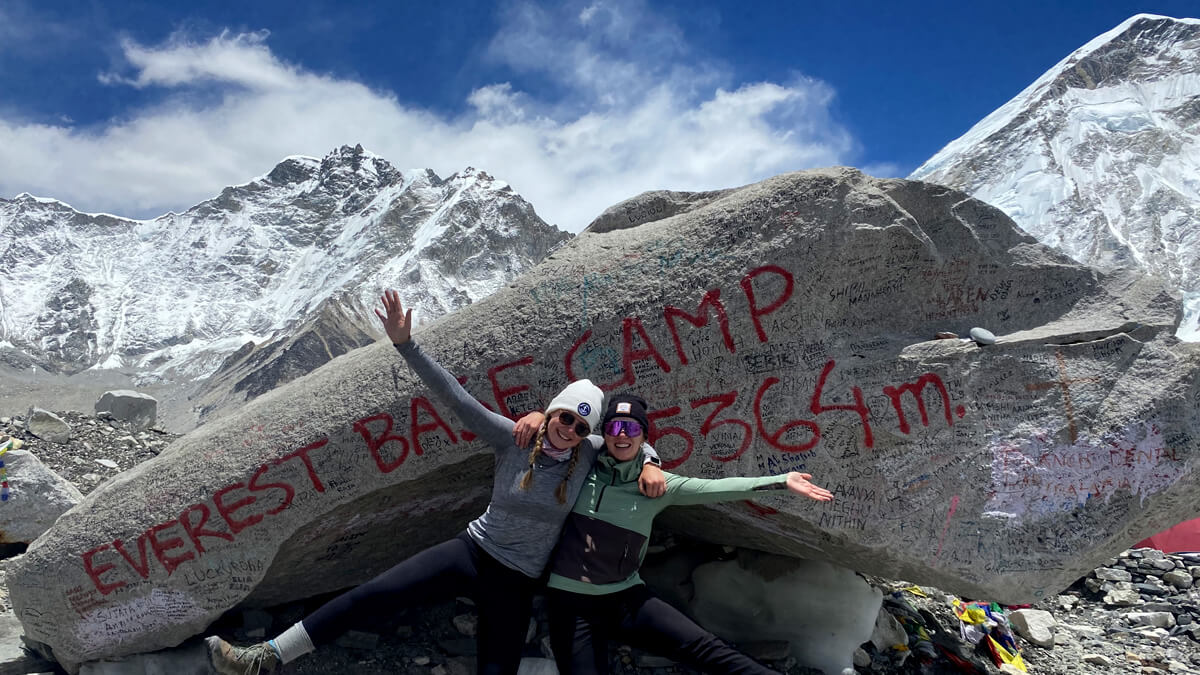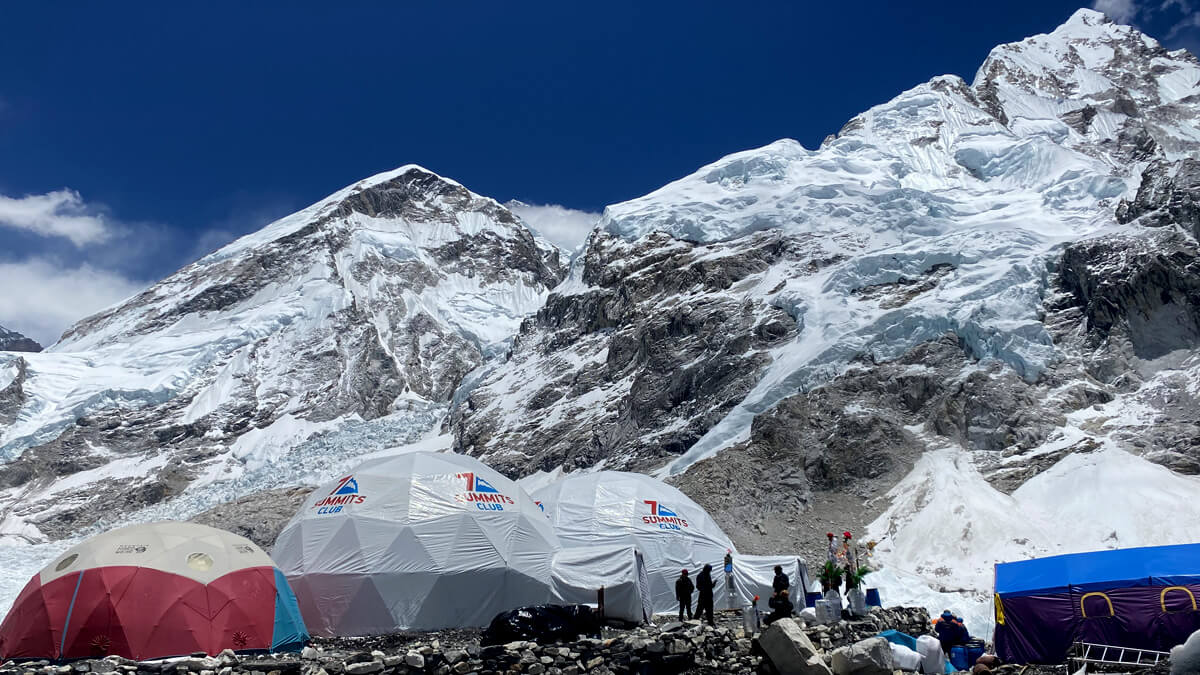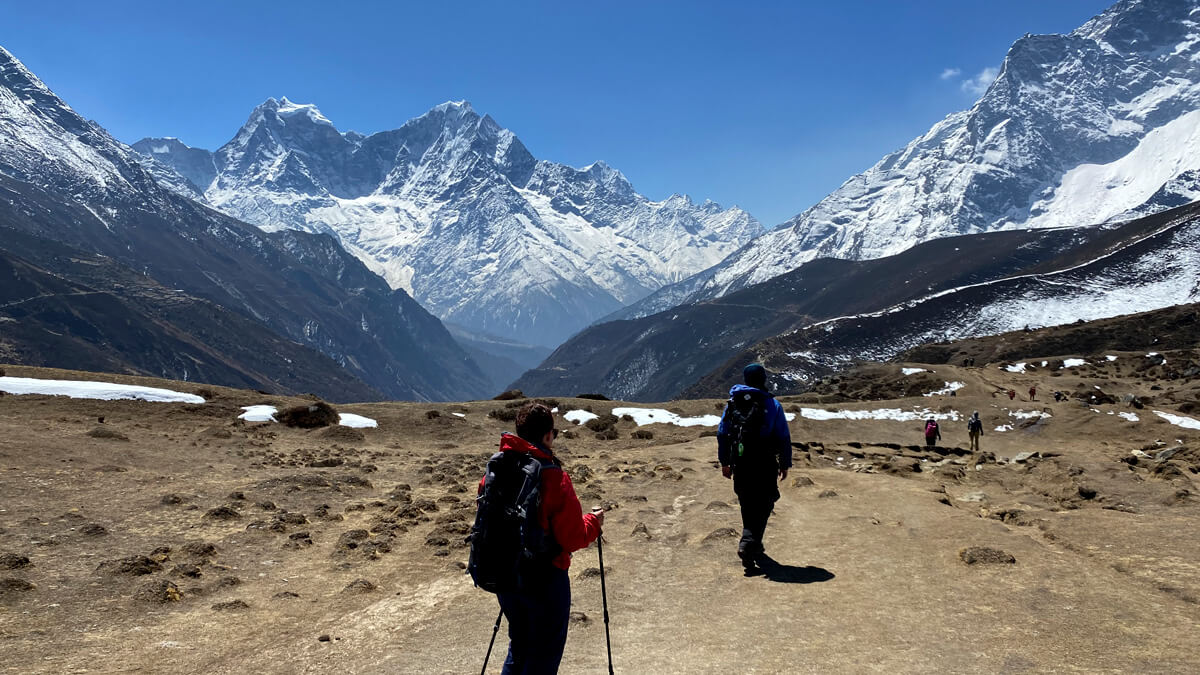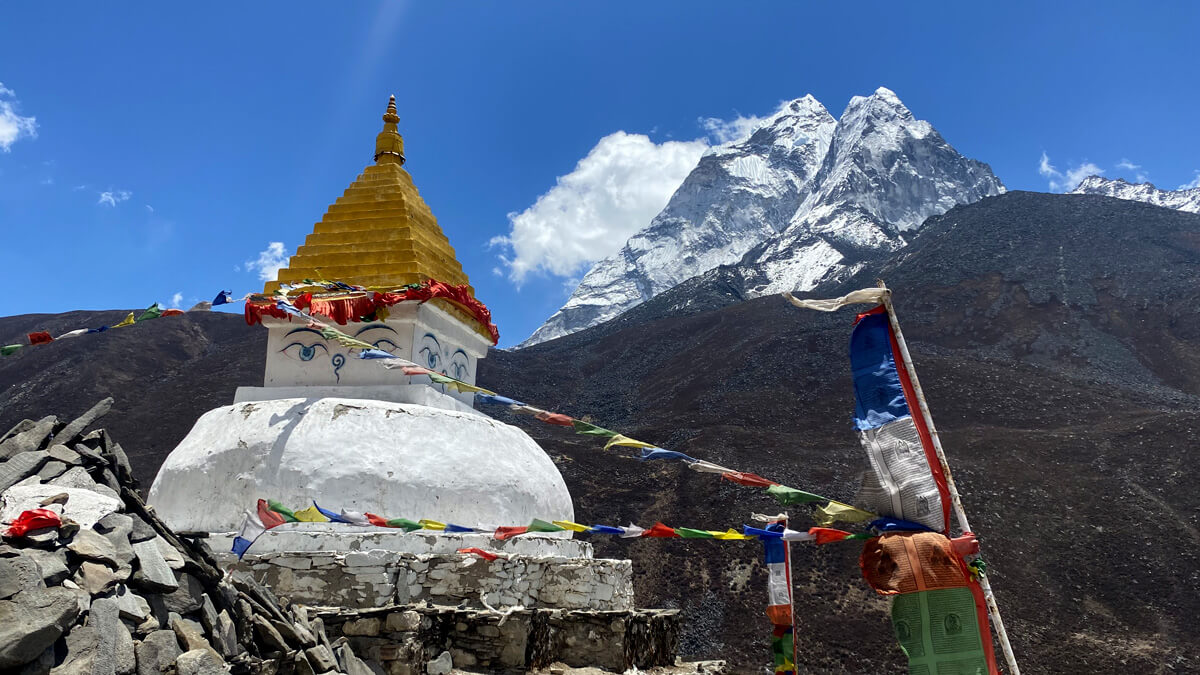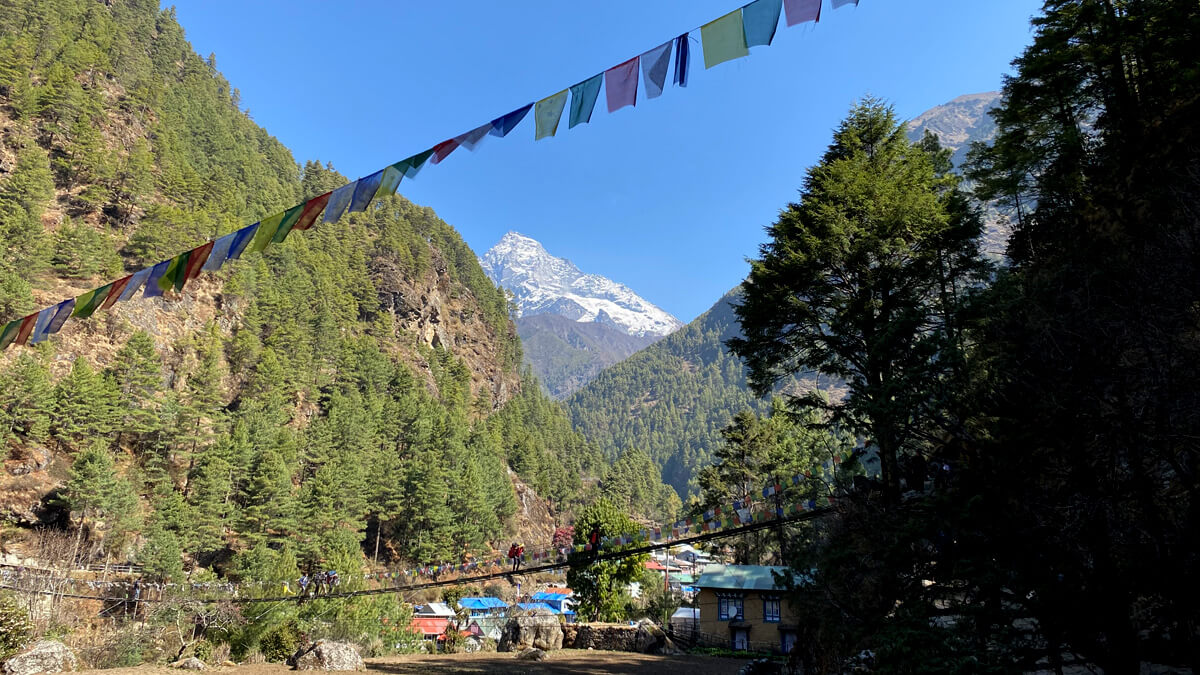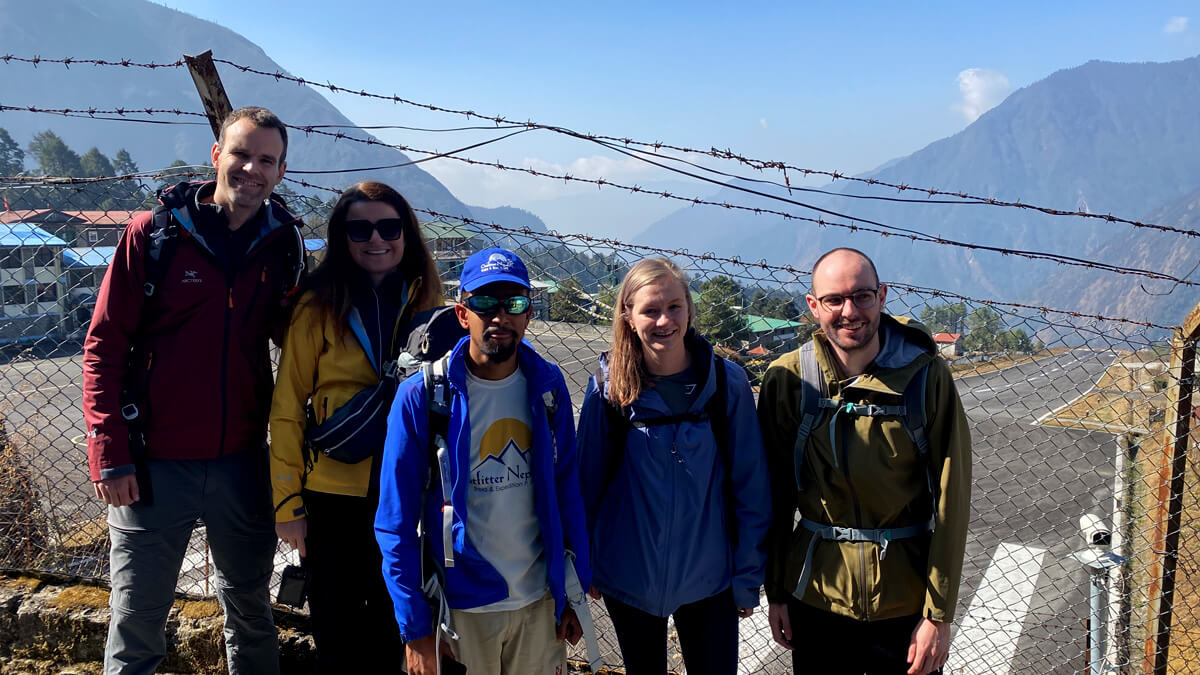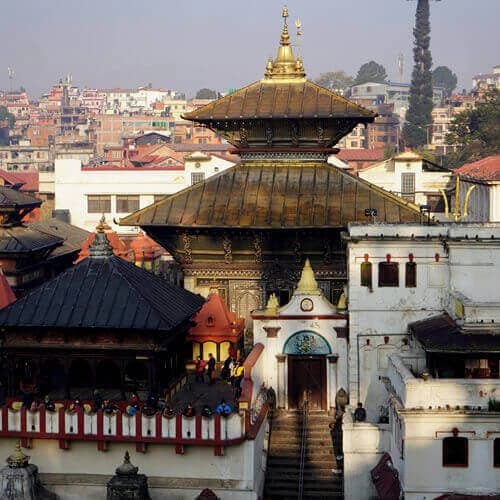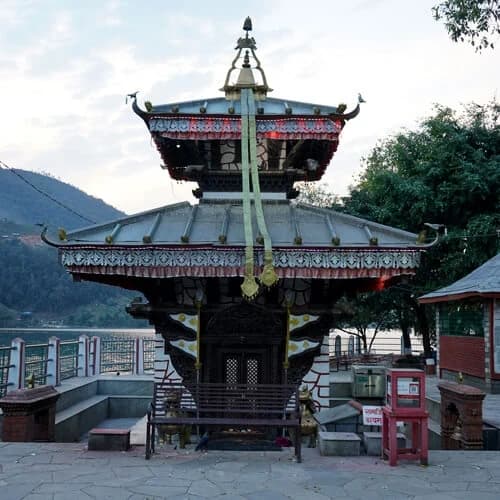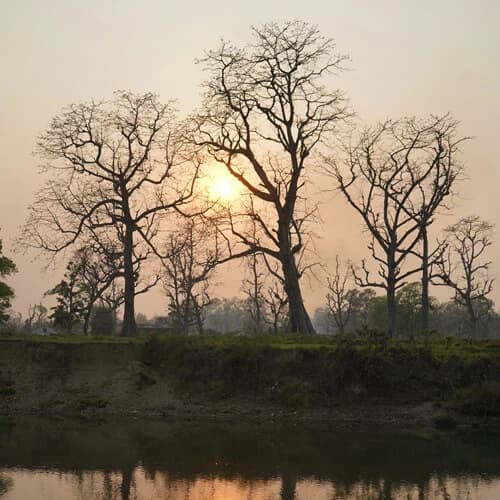12 Days Everest Base Camp Trek Cost
The total cost of the package depends on the season, itinerary, level of service, amenities, and whether you choose a local agency/international agency or travel independently. To paint a realistic picture, in general, the 12 Days Everest Base Camp Cost ranges between $997- $1195 per person. This includes your domestic flight between Kathmandu and Lukla or Manthali to Lukla, necessary permits (Sagarmatha National Park Entry and Khumbu Pasang Lhamu Rural Municipality fees), accommodation, meals, professional guide, porter/helper, transportation, and logistics.
However, some expenses are not included in the package, such as international flight tickets, visa, travel insurance, hot showers, Wi-Fi, charging, snacks, and personal gear and equipment. On average, you will be spending $30 to $50 per day on the trail. Apart from this, there are no hidden costs in the packages we offer. Besides, the cost will only be incurred if you decide to include extra amenities or want to upgrade your service. For instance, you will have to pay an additional fee if you want to change your standard room to a luxury room with an attached bathroom, hot shower, etc.
What is the Best Time for 12 Days Everest Base Camp Trekking?
Late September to November and February to May are the best months for trekking in Nepal. These times feature good visibility, optimal temperatures, and stable weather conditions. In general, the spring and autumn seasons offer pleasant conditions for travelers to experience the unique challenges and rewards of the EBC trek.
Spring (February, March, April, and May)
As winter ends, spring temperatures become moderate, ranging from 10°C to 15°C. Clear skies and stable weather conditions categorize this season. The trails are dry and navigable, reducing the challenge caused by thick and slippery snow. Rhododendrons and several other flowers start to bloom, enhancing the region's natural beauty with vivid colors. The skies are clear, and you will have unobstructed views of towering peaks.
Autumn (September, October, November, and December)
The weather in Autumn is clear and crisp, providing travelers with some of the best Himalayan vistas in the region. The temperature averages around 10°C to 20°C at lower elevations, but it gets colder the higher you ascend. As the season begins after the monsoon, the trails are dry, firm, and less crowded, offering a tranquil trekking experience. You will also have an intricate cultural immersion, as you can participate in festivals like Dashain and Tihar.
12-Day Everest Base Camp Trek Difficulty
The trek to Everest Base Camp is usually described as "moderately difficult," and while there is no technical climbing required, the elevation gain, weather conditions, varied terrain, and long-distance hiking drain your body and mind. Let's get a little more specific in our description of the challenges faced on the way:
Altitude & Acclimatization: As you ascend past Namche Bazaar and approach the 4,000-meter mark, the air thins, and even a simple task like walking up a short incline becomes an aerobic workout. It is highly recommended not to ascend more than 300m per day to avoid altitude sickness and aid acclimatization.
Rugged Terrain & Variability: The trails to the EBC include steep stone steps, suspension bridges over gorges, ice fields, and boulder tracks, which constantly shift with altitude and season. These variations in terrains you hike on slow you down, strain muscles, and require more cardiovascular control than flat trails.
Distance & Fatigue: Some days of the trek, you will be covering a distance of 15 km, which means you will be walking for 8 to 9 hours, including acclimatization hikes to vantage points like Kala Patthar. For those who have no prior trek experience, this could mean you will be significantly drained and fatigued from the hike.
Weather & Seasonality: The weather in the high-altitude region is unpredictable, which means you might experience sudden downpours of rain, hail, blizzards, and fog. This can halt the trek and make the trail slippery from ice and snow, especially during winter or monsoon. It is recommended to begin your trek during spring and autumn for optimal trek conditions.
Flight to Lukla and Weather Conditions and Delays
The journey to the Everest region begins with the most thrilling and unpredictable leg of the trip; the scenic 40-minute flight to the Tenzing‑Hillary Airport, Lukla. The airstrip is a 527 m uphill runway carved into a mountain slope, and is often remarked as one of the thrilling airports in the world. On most days, the weather in this region is clear, especially during spring and autumn, offering a bird's-eye view of the mountains to the travelers.
However, the weather can change drastically in a matter of moments without any warning. This leads to a high rate of delays and cancellations due to windstorms, rain, blizzards, and snow that affect the visibility and cause turbulence. Therefore, it is recommended to build in a few extra buffer days in your itinerary in case of flight cancellations and delays. Also, in such events, we will arrange the next available slot for your flight for a seamless travel experience.
Besides, trekkers are often surprised to learn that for the peak trek season, particularly the flights to Lukla, do not depart from Kathmandu, but from a smaller, less congested airport in Ramechhap. This requires an early morning, 4-5 hour pre-dawn drive from Kathmandu, a factor that adds its layer of adventure and logistical planning. Once at the airport, the flight itself is a nail-biting, 20-25-minute journey through a scenic mountain valley.
12 Days Everest Base Camp Trek Booking
Safe Trek Bookings: When you reserve your trek with Outfitter Nepal, you're booking via a safe and transparent medium, with your deposit paid through secure online payment. The transaction can be made via credit card, bank transfer, or mobile banking. The remaining amount can be made in cash (USD or NPR) at our office upon your arrival. You can also cause cancellations, but you have to inform us 31 days before the departure date. On the other hand, if you would like to change the travel date, we will keep the deposit until you select a schedule that meets your preferences.
Private Treks: With Outfitter Nepal, you get the mountain experience tailored to you. Our small private groups (1–8 people) offer personalized attention from guides and porters, and the freedom to walk at your own pace. What’s more is that your trekking experience won’t change even if your group is below the typical size because the departures are guaranteed, never canceled due to low bookings. In short, with the private trek, you get exclusivity without compromising on safety, immersive culture, and personal attention.
Last-Minute Bookings: If you're set on trekking to Everest Base Camp and you can’t decide on your schedule, then you’ll be glad to know Outfitter Nepal can secure your trek even if you're in Kathmandu just two to two-three days before departure, as long as full payment is made for the reservation . This means that even under time pressure, say your flight lands late or personal plans shift, you don’t have to sacrifice the EBC dream.
Flexible Scheduling: If you've ever asked yourself, “What if my plans shift—can I still trek with Outfitter Nepal?”Here's the good news: the answer is a yes. Through our “Customize Trip form”, you’re free to select your departure date, for example, choose a preferred travel date, add an acclimatization day, all without hidden fees. In essence, you design your route and start date.
How To Get Prepared For the Everest Base Camp 12-day trek?
Our 12-day EBC trek is a shortened version of the standard 14-day EBC trek. As a result, it becomes crucial for you to adapt to acclimatization strategies and prepare physically for the high-altitude journey. Travelers will require a thoughtful, layered approach that goes beyond just buying new gear. You will need to train your cardio and stamina to stimulate hiking on the steep terrains. Here are some ways to get you ready for the trek ahead.
- Start training, two to three months ahead of the planned trip date.
- Try activities such as jogging, cycling, fast walking, and running on a treadmill to build your stamina and endurance.
- Incorporate exercises that require lifting weights to strengthen your core muscles, including your back and legs.
- Include physical activity like swimming, stretching, and yoga to enhance your flexibility and muscle mobility.
- Consume a balanced diet, and drink a lot of water with electrolytes to recover and rejuvenate your body.
- Practice mindfulness and have a realistic expectation to avoid anxiety on the trail.
- Pack durable, high-quality gear and clothing to stay warm and safe during the trek.
Additionally, we suggest you not to underestimate the psychological toll of continuous walking and having to adapt to thin air at higher altitudes. A key insight is to prepare your body for a low-oxygen environment not just with exercise, but by understanding the critical importance of a properly-paced itinerary.
The 12-day itinerary is a well-designed plan with two acclimatization days, typically in Namche Bazaar and Dingboche. These aren't your typical days off; instead, they are acclimatization days based on the 'climb high, sleep low' method, where a short hike to a higher elevation helps your body adapt to the elevation before you return to a slightly lower altitude to relax and recover.
What are the best options for the Trek: Independent or Guided EBC Trek
Choosing between an independent and guided trek to Everest Base Camp (EBC) is subjective. It depends mainly on your experience, confidence in navigating Himalayan terrain, and the kind of trekking experience you're seeking. Independent trekking offers a greater sense of freedom and flexibility where you can set your own pace, adjust your itinerary on the fly, and often save money. However, since the region is remote and high-altitude, independent travel requires navigation skills, understanding of acclimatization procedures, and knowing how to manage emergencies without support. According to recent regulations, solo trekking without a qualified guide is not allowed in certain restricted regions of Nepal. But, while EBC is not officially restricted, a guide is strongly suggested for your safety and well-being.
On the other hand, a guided EBC trek provides logistical support, safety, and cultural insight. Guides undergo high-altitude first aid training and can spot altitude sickness symptoms early on, making your journey safer. They also take care of permits, accommodation, food, and flight reservations, as well as other essential details for a seamless travel experience. In addition, guides bring the trail to life with local stories, Sherpa culture, and historical context that you would probably miss on your own. For first-time trekkers or those who are inexperienced with high-altitude trekking, a guided trek is the best option. The best option aligns with your comfort level, goals, and the level of assistance you prefer along the way to one of the world's most famous trek trails.
Cultural Insights of the Everest Region: Sherpa Traditions and Local Life
The Everest region offers travellers a profound immersion into a world where spirituality, tradition, and everyday life are intertwined. Tibetan Buddhism is at the heart of Sherpa culture, and this can be seen in the countless mani walls upon which auspicious mantras are inscribed, praying flags that flutter along high mountain ridges, and snow-white stupas that stand along trails for trekkers to receive blessings. Monasteries like Tengboche and Pangboche are also spiritual and cultural sites, where rituals, festivals, and teachings uphold traditional customs.
The best-known of the auspicious occasions is the Mani Rimdu, which is celebrated in the fall session. During this festival, masked dances and grand ceremonies are performed to commemorate the founding of Buddhism by Guru Rinpoche Padmasambhava. Similarly, Dumji festival follows the Tibetan Lunar Calendar, and commemorates the birth of Guru Rinpoche (also known as Padmasambhava). Similarly, during the Tibetan New Year, or Losar, the locals celebrate the occasion with vibrant religious ceremonies, cultural performances, and family gatherings.
Altitude Sickness and Remedies During the 12-Day EBC Trek
Altitude sickness, or Acute Mountain Sickness (AMS), is a significant concern during the EBC trek as it can affect anyone regardless of age, fitness level, or experience. Many trekkers assume that hiking slower or drinking more water is an effective cure, but the reality is different. At elevations above 3,000 meters, especially around Namche Bazaar and Dingboche, where the oxygen level drops significantly, your body begins adjusting to the thinner air.
The first remedy is less about medication and more about a deeply disciplined self-awareness. When you get to your teahouse for the evening, the single most valuable thing you can do is check in with your guide. A good guide isn't just a walking GPS; they're a human sensor, trained to spot the subtle changes in your behavior or appetite that you might be ignoring. Some of the early symptoms you need to look out for include:
- Headache, lightheadedness, and dizziness
- Nausea, lack of appetite
- Fatigue, insomnia
- Shortness of breath, changes in breathing pattern
If these symptoms worsen, especially if you experience confusion, loss of coordination, or breathlessness at rest, you must report it to your trek leader and descend immediately. In such circumstances, it is advised to take Diamox under the prescription of a healthcare provider to alleviate the symptoms. To effectively avoid the risk of altitude sickness, it is recommended to maintain hydration, consume high-carb meals, and maintain a steady pace during the trek.
Additionally, a lesser-known remedy practiced among trekkers is drinking garlic soup and ginger tea, a local remedy believed to help circulation and aid the body in adapting to the increasing altitude. Overall, we do not recommend overexertion and advise you to take frequent breaks along the trail. Respecting the mountain means respecting your body's limits, and the best remedy for altitude sickness is prevention through awareness, honesty, and a flexible mindset.
Acclimatization During the 12-Day EBC Trek
At OutFitter Nepal, we prioritize your safety and well-being above all else. As you gain altitude, especially above 3,000 m, air pressure and oxygen levels drop significantly as compared to sea level. And, without proper acclimatization, trekkers risk developing Acute Mountain Sickness (AMS), or even life‑threatening forms like HAPE or HACE.
To resolve this concern, we carefully designed protocol aims to minimize that risk, maintain group pace, and ensure safety so you feel strong en route to EBC. Our trained guides carry oxygen cylinders and satellite communication, and they're briefed daily to spot early warning signs before symptoms escalate. Here are some of our core acclimatization strategies that we implement to ensure a safe and enjoyable trek experience:
- Two Dedicated Acclimatization Days: Rest days in Namche Bazaar (3,880 m) and Dingboche (5,090 m) include short hikes to higher elevations in the morning (“hike high”) and sleep lower in the lodge (“sleep low”) to safely boost red blood cell production and oxygen utilization.
- Daily Oxygen Saturation Monitoring: Guides will use an oximeter each morning to monitor your health and well-being, conducting regular checks for signs of altitude sickness.
- Controlled Hydration and Nutrition: The recommendation: drink 3.5–4 litres per day, with salty soup and herbal (e.g., garlic or ginger) teas to aid hydration. Meals focus on high‑carbohydrate, easily digestible foods; alcohol, caffeine, and heavy proteins are discouraged.
- Gradual Elevation Gain & Flexible Itinerary: Our itinerary limits maximum daily ascent to ~500–600 m. Additionally, routes can be adjusted if someone shows early signs of AMS, such as adding an extra rest day.
- Preventive Diamox Use (if medically approved): Under doctor supervision, a low-dose regimen (e.g., 125 mg acetazolamide every 12 hours) is optionally taken before reaching 3,000 m. This promotes faster acclimatization but requires proper medical guidance.
- Stable pace: Trekkers hike at a conversational pace, allowing for frequent rest to prevent your body from over exhaustion.
- Trained First‑Aid Response & Evac Plan: Our guides are well-trained to respond to the events of an emergency. They will be equipped with an oxygen canister and a satellite phone to ensure you are well taken care of and evacuated back to safety via a helicopter rescue.
12 Days Everest Base Camp Trek Distance and Elevation
The total distance covered on the 12-day EBC trek is approximately 130 kilometers/80 miles, and covering such a distance can be challenging due to the dramatic elevation gain and the rugged Himalayan terrain. You'll begin at Lukla (2,860 meters) and gradually ascend to Everest Base Camp at 5,364 meters, with the highest sleeping point being Gorak Shep (5,164 meters), and optional sunrise hikes to Kala Patthar (5,545 meters) for panoramic Everest views.
The trail doesn't steadily climb; it descends drastically at some points of the trek as well. That means you'll experience a surprising amount of downhill hiking even as you progress to higher elevations. For instance, you might descend several hundred meters just before reaching your next higher campsite, which can be mentally frustrating and physically draining. Firsthand experiences often describe the trek as more of a "mountain rollercoaster" than a straight uphill climb. In this scenario, pacing becomes vitally essential, not only to control fatigue, but also to give your body time to acclimate to the thinning air.
Daily walking distances are pretty variable, ranging from 8 to 15 kilometers per day, depending on terrain and altitude. The higher you go, the slower you will hike, and not because the trails are getting harder, but because your lungs are working harder with less oxygen. This trek is not just about the destination; it is about understanding the rhythm of the Himalayas and how every meter gained comes through patience, and persistence.
Accommodation on the 12-day journey to Everest Base Camp
One of the most significant merits of the EBC trek is that it is one of the most popular trekking trails in Nepal. The trails you will be hiking on are well-maintained, marked, and feature several infrastructures, including accommodations. The lodging experience on the trek is a journey in itself, evolving dramatically from the foothills to the high-altitude villages. You will be staying at teahouses, which are simple, family-run lodges, offering glimpses into Sherpa hospitality, local culture, and high-altitude living.
In the lower regions, particularly in Namche Bazaar and Lukla, you can find lodges that offer heated dining rooms, en-suite bathrooms, and other luxury services. If you want to elevate your standard of accommodation throughout the trek, you can upgrade the package to luxury or custom-tailored according to your preference. However, it is essential to remember that lodging choices can differ in availability and quality according to the time of year and the season.
However, as you ascend past Namche and into the wild high country, the accommodation landscape shifts dramatically. The standards of the room might differ in some places, not due to lack of care, but because of their remote location. Additionally, most of the equipment and supplies are transported via porters or yaks. This results in costlier prices for food items, and basic services and amenities you use while staying at higher altitudes. The simple luxuries of the lower villages, like hot showers, charging ports, and Wi-Fi, are charged an extra fee for their usage.
Having said that, as you ascend higher, the rooms you will be staying in are often constructed with thin plywood walls. So, bringing your sleeping bag rated for sub-zero temperatures is crucial, as the blankets alone won't suffice at higher elevations. The dining rooms are usually the warmest communal areas, heated by a yak-dung stove, and this is where trekkers share meals, stories, and warmth. Beyond basic comfort, these teahouses offer a chance to slow down and connect with fellow travelers. This is a once-in-a-lifetime experience at the high Himalayan mountains, not in luxury, but in quiet, high-altitude resilience.
Available Food Options on the 12-Day Everest Base Camp Trip
Food on the EBC trek is crucial not just for sustaining your body but for the culinary experience of the Everest region itself. The breakfast, lunch, dinner, and beverages are served at teahouses, where you'll find a standard but comforting menu repeated across villages, with slight variations depending on altitude. One of the staple dishes is Dal Bhat, which is a favorite amongst trekkers in the Himalayas of Nepal.
We highly recommend embracing the "Dal Bhat Power 24 Hour" mantra as this hearty Nepali combo is nutritious, endlessly refillable, and offers a balance of carbs and protein. Additionally, in the early stages, like in Lukla and Namche Bazaar, the menus are surprisingly extensive, featuring everything from Western comfort foods to a mix of Tibetan and Indian cuisine. Western-inspired options include sandwiches, apple pie, oatmeal, macaroni, burgers, pancakes, and cereals.
Whereas, the Tibetan dishes listed in the menu include thukpa, dumplings, Tibetan bread, and Shapta. Keep in mind that the meal options for lunch and dinner are the same in most teahouses and lodges. For breakfast, you can enjoy a warm cup of tea, coffee, milk, juice, or a beverage of your choice from our menu. Besides, vegetarian and vegan meals can also be arranged during the trek. But, you must inform us in advance, which will allow us to collaborate with the teahouses to cater to your preferences.
Internet, Wi-Fi, and ATM Facilities During the EBC Trek
The infrastructure and internet services during the Everest Base Camp trek are basic and offer a unique travel experience for those new to the wilderness. Here's what you can expect during the journey in the Himalayas of Nepal:
Internet and Wi-Fi: You'll have access to the internet and Wi-Fi in every village on the trail, but it's essential to understand that the signal might fluctuate as you ascend to higher altitudes. You can opt to use local SIM cards, including Ncell and NTC, to stay connected to the internet. They can be bought at kiosks at the airport or from local shops in Thamel, Kathmandu.
The 4G mobile data is reliable in most parts of the trail and will allow you to make video calls or upload posts on your social media. Similarly, you can use Wi-Fi at the teahouses for a daily fee of USD 5. On the other hand, Wi-Fi prepaid cards, Everest Link Hotspot, or Everest LINK's Wireless Internet are also available for a nominal charge. These services provided by Everest Airlink are mostly priced around NPR 800–1200 for 24–48 hours.
ATM: You can withdraw your money at ATMs in Kathmandu, Lukla, and Namche Bazaar. As you ascend higher, they won’t be available, and most establishments won’t be accepting credit cards for transactions. So, it is highly recommended to carry enough cash before the start of the trek. Besides, if you want to exchange your currency, we suggest you exchange it in Thamel at a premium rate with no service charge included. The bottom line is, your extra budget for the trek must cover daily expenses without creating logistical hassle.
Required Permits for the 12-Day EBC Trek
Wondering what official papers you need for a 12‑day Everest Base Camp trek and how to navigate the permit maze? Here's a summary along with tips regarding the permits you will need.
- Sagarmatha National Park Entry Permit: This gives you access to the national park and must be visible on your backpack at the Monjo gate. As of 2025, it costs NPR 3,000 ($25) for international visitors, NPR 1,500 ($15 ) for SAARC nationals, and nominal fees or free for Nepalese and children.
- Khumbu Pasang Lhamu Rural Municipality Permit: Replacing the old TIMS card, this rural authority pass supports community projects, trail maintenance, and local healthcare. It can only be purchased in Lukla or Monjo, and costs NPR 2,000 ($15‑20) per person for stays up to four weeks.
Besides, if you’re taking the classic Jiri‑Lukla overland route (instead of flying in). In that case, you’ll also need a Gaurishankar Conservation Area permit (NPR 2,000), available at Shivalaya or Kathmandu, because that trail passes through a different protected zone.
Note: As of 2018 and upheld through 2025, you no longer need a TIMS card for Everest treks, hold onto those two permits, and always carry a color copy of your passport with you at all times: it’s what park staff will compare against at checkpoints.
Route Options and Alternatives for the Everest Base Camp Trek 12 Days
When travelers ask, "Are there any other ways to reach Everest Base Camp in just 12 days?", the answer is yes, and these alternatives can turn a standard trek into a layered Himalayan narrative. Choosing among the different ways to reach EBC within a tight 12‑day window isn't just about scenery; it's about safety, cultural immersion, and enjoyment. Some routes offer better acclimatization, others avoid crowds, some offer more panoramic views, and a few pack in convenience with a flight. Here are alternatives for the 12-Day EBC trek, which you can choose according to your preferences:
Standard EBC trek with Helicopter return (9 days): Fly to Lukla (~2,860 m), walk through Phakding, Namche (incl. acclimatization day), Tengboche, Dingboche, climb to EBC, Kala Patthar, and return to Kathmandu via a helicopter flight from Gorakshep.
Gokyo Lakes & Cho La pass with EBC (15 days): Trek through the classic EBC trail to Gokyo Lakes, and climb Gokyo Ri, cross Cho La pass (5,420 m), and proceed to Base Camp, Kala Patthar, Gorakshep, Lobuche, and then fly out back to Kathmandu on a helicopter.
Renjo La high‑pass with EBC (12 days): After reaching Namche or Dole, reroute via Gokyo or Renjo La ( 5,360 m) into the EBC area, and pass back through the less-visited Nagpa La trail and villages like Thame and Lungden.
Trip Extensions After the 12-Day Everest Base Camp Trek
After conquering the EBC trek, many travelers find they still have a few days to spare and a deep desire to explore more of Nepal. One of the best ways to turn your Everest Base Camp journey into a more immersive travel experience is to add a thoughtful trip extension. The most popular choice is to transition from the icy, high-altitude world of the Himalayas to the lush, subtropical jungle of Chitwan National Park.
A firsthand perspective from those who do this highlights the dramatic contrast; one day you're bundled in down jackets, the next you're on a jeep or canoe safari, searching for one-horned rhinos, Bengal tigers, and crocodiles in a completely different ecosystem. This is not only a fantastic way to experience the incredible biodiversity of Nepal, but it also allows your body to recover in a much more relaxed and warmer environment.
On the other hand, travelers who seek a cultural getaway, can choose to extend their stay with a comprehensive tour of the Kathmandu Valley. This allows them to explore the UNESCO World Heritage sites of Durbar Squares, visit ancient temples and stupas, and immerse themselves in the rich history and art of the Newari people, a perfect finale to a high-altitude odyssey.
Helicopter Upgrades for the 12-Day Everest Base Camp Trek
The inclusion of a helicopter return on your trek will save significant time and offer unbeatable aerial views of the snow-capped mountains. Most itineraries include trekking for over 9 days and flying out from Gorak Shep or Lukla on day 10 or 11. A helicopter ride from Gorak Shep directly to Lukla or Kathmandu typically cuts out two trekking days. The shared flight rates for a chartered helicopter range from USD 400 to USD 600 per person, depending on group size, season, and the airline.
Aside from saving time, helicopter upgrades also reduce physical exhaustion after days of hiking in high-altitude regions. For many less experienced travelers, the final stretch of the trek can be mentally and physically exhausting. So, a helicopter flight back to Kathmandu adds an element of comfort, especially during periods of delays and cancellations caused by bad weather. It is an ideal way to complete the challenging and stunning hike to Everest Base Camp.
Note: The weight limit for the helicopter flight back to Kathmandu is 350 to 400kg, which accounts for 15kg per person, including the pilot.
Porter Weight Limit and Guidelines for EBC Trekking
While hiking to Everest Base Camp, it's essential to learn about porter weight limits and ethical considerations to ensure the fair treatment and safety of porters. The maximum weight that a porter can carry in Nepal is 22-25 kg, and a single porter is assigned for every two travelers. If your baggage exceeds the 22-25kg weight limit, you'll be required to pay an additional charge. The restriction is not just for regulatory reasons, but also to ensure responsible tourism.
Porters work long days at high altitude on rugged trails, and overloading packs leads to exhaustion, injury, or long-term health issues. Additionally, practical packing is also crucial, which avoids unnecessary items that don't benefit you during the trek. Beyond these guidelines, responsible trekking involves being respectful to porters, learning a few Nepali phrases, and showing gratitude for their hard work. Your journey to EBC is made possible by the strength, dedication, and resilience of the guides and porters. We highly suggest you treat them with the respect they truly deserve.
Tipping Culture in Nepal
Tipping is customary and is greatly appreciated, especially in the tourism and trekking industries, as guides and support staff work to ensure that travelers have a secure, smooth, and pleasant experience. It is expected that you tip 10-15% of your overall trek cost as a general guideline. We recommend that you do so in person to express your appreciation for their hard work and dedication.
Important Notes for the 12 Days Everest Base Camp Trekking
- Aim to arrive in Kathmandu 1–2 days ahead of your flight to Lukla and leave some extra time in case the return flight gets delayed or cancelled.
- You'll need a TIMS card, Sagarmatha National Park entry fee, Nepal entry visa, four passport photos, and fully comprehensive travel insurance that covers emergency helicopter evacuation above 5,500 m.
- Carry insulated water bottles and rehydration salts to stay hydrated, and eat every 2–3 hours to keep your energy up.
- Cold weather drains batteries fast, so store phones, cameras, and power banks inside your sleeping bag to keep power. It is also recommended to carry spare batteries and a power bank as backup in case of power cuts during your stay at the teahouses.
- Listen to your body, rest when needed, and be ready to accept minor pace adjustments or extra days.
- Hot showers are rare and expensive, so carry wet wipes, hand sanitizer, and toilet paper.
Why Outfitter Nepal Is the Ideal Agency for Your 12-Day EBC Trek
With Outfitter Nepal, you’re not just booking a trip, you’re signing up with a team licensed by Nepal’s tourism authorities. Founded in 2008, we have spent over 15 years specialising in Everest and Annapurna routes, all while retaining the mountain-smarts that make a trek safe and joyful. As a fully registered member of the Trekking Agencies’ Association of Nepal (TAAN), we follow the official permit, insurance, and evacuation protocols mentioned by the government.
Each of our guides on our treks is formally trained through the Nepal Mountain Academy’s Mountain Safety and First Aid module. They are well knowledgeable regarding altitude-acclimatization, oximeter, and rescue procedures just as you’d expect in any international-standard expedition. And yes, with us, you will be travelling responsibly and sustainably as well. We strictly follow Porter-Welfare standards, ensure fair wages, and refuse single‑use plastics, carrying out trash from even the smallest tea‑houses to keep Khumbu as clean as we found it.



